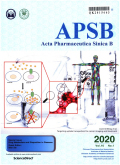- 钛学术文献服务平台 \
- 学术期刊 \
- 医药卫生期刊 \
- 药学期刊 \
- 药学学报(英文版)期刊 \
Tubeimoside-1 induces TFEB-dependent lysosomal degradation of PD-L1 and promotes antitumor immunity by targeting mTOR
Tubeimoside-1 induces TFEB-dependent lysosomal degradation of PD-L1 and promotes antitumor immunity by targeting mTOR
基本信息来源于合作网站,原文需代理用户跳转至来源网站获取
摘要:
Programmed cell death ligand 1 (PD-L1)/programmed cell death protein 1 (PD-1) cascade is an effective therapeutic target for immune checkpoint blockade (ICB) therapy.Targeting PD-L1/PD-1 axis by small-molecule drug is an attractive approach to enhance antitumor immunity.Using flow cytometry-based assay,we identify tubeimoside-1 (TBM-1) as a promising antitumor immune modulator that negatively regulates PD-L 1 level.TBM-1 disrupts PD-1/PD-L1 interaction and enhances the cytotox-icity of T cells toward cancer cells through decreasing the abundance of PD-L1.Furthermore,TBM-1 exerts its antitumor effect in mice bearing Lewis lung carcinoma (LLC) and B 16 melanoma tumor xenograft via activating tumor-infiltrating T-cell immunity.Mechanistically,TBM-1 triggers PD-L1 lyso-somal degradation in a TFEB-dependent,autophagy-independent pathway.TBM-1 selectively binds to the mammalian target of rapamycin (mTOR) kinase and suppresses the activation of mTORC1,leading to the nuclear translocation of TFEB and lysosome biogenesis.Moreover,the combination of TBM-1 and anti-CTLA-4 effectively enhances antitumor T-cell immunity and reduces immunosuppressive infiltration of myeloid-derived suppressor cells (MDSCs) and regulatory T (Treg) cells.Our findings reveal a previ-ously unrecognized antitumor mechanism of TBM-1 and represent an alternative ICB therapeutic strategy to enhance the efficacy of cancer immunotherapy.

推荐文章
PD-1/PD-L1在脓毒症免疫中的作用
程序性死亡分子-1
程序性死亡分子-1配体
脓毒症
免疫抑制
抗PD-1抗体和抗PD-L1抗体临床使用的护理
抗PD-1抗体
抗PD-L1抗体
免疫治疗相关不良反应
护理
PD-L1和PD-1在外周T细胞淋巴瘤中的表达及临床意义
外周T细胞淋巴瘤
程序性死亡1-配体
程序性死亡因子-1
免疫组织化学
Kaplan-Meiers评估
PD-1/PD-L1通路在七氟醚致大鼠术后认知功能障碍中的作用
程序性死亡受体1
程序性死亡受体配体1
术后认知功能障碍
七氟醚
炎症反应
内容分析
关键词云
关键词热度
相关文献总数
(/次)
(/年)
引文网络
引文网络
二级参考文献 (0)
共引文献 (0)
参考文献 (0)
节点文献
引证文献 (0)
同被引文献 (0)
二级引证文献 (0)
2021(0)
- 参考文献(0)
- 二级参考文献(0)
- 引证文献(0)
- 二级引证文献(0)
引文网络交叉学科
相关学者/机构
期刊影响力
药学学报(英文版)
主办单位:
出版周期:
双月刊
ISSN:
2211-3835
CN:
10-1171/R
开本:
出版地:
北京市先农坛街1号
邮发代号:
创刊时间:
语种:
eng
出版文献量(篇)
688
总下载数(次)
0
总被引数(次)
1428
期刊文献
相关文献
推荐文献
- 期刊分类
- 期刊(年)
- 期刊(期)
- 期刊推荐

 免费查重
免费查重










